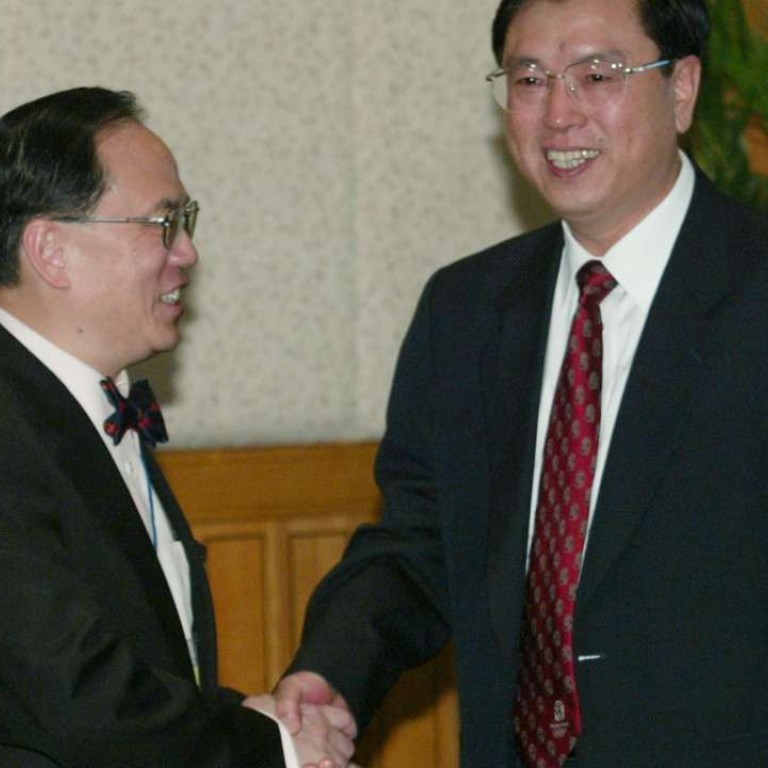
Zhang Dejiang: Beijing strongman with a knack for getting results
If ever there was a day when Zhang Dejiang earned his reputation as Beijing’s “iron-fist enforcer” in Hong Kong, it must have been on September 25, 2005.
On that day, as Guangdong Communist Party Secretary, Zhang had a closed-door meeting with 59 Hong Kong lawmakers, who were on a two-day trip to the province organised by Chief Executive Donald Tsang Yam-kuen.
They were given a high-profile reception. But there was a tense moment in the groundbreaking visit when four pro-democracy lawmakers raised the question of reversing the official verdict on the 1989 Tiananmen crackdown.
Until then, no senior mainland official had discussed the Tiananmen verdict in a face-to-face meeting with Hong Kong democrats. Zhang was unfazed, marshalling a blunt and unequivocal response.
“If there is no common ground, there is no point for discussion,” said Zhang, before asserting that the central government had made the right decision on June 4.
Recollecting his encounter with Zhang 11 years ago, “Long Hair” Leung Kwok-hung said he also told Zhang that “one-party dictatorship” on the mainland was inconsistent with the Chinese constitution and the principle of socialism.
“But Zhang emphasised that ‘one-party dictatorship’ was one of the four cardinal principles stated in the Chinese constitution,” Leung said.
It was also in the same year that Zhang drew fire for violent crackdowns on social unrest in Guangdong. In 2005, police were believed to have killed 20 people in Dongzhou village in Shanwei when they fired into a crowd protesting against inadequate land compensation. Police also raided Taishi village to put down protests against village officials.
The tense episode came two years after Zhang received the heaviest criticism for his response to the outbreak of severe acute respiratory syndrome, which observers argued was made worse by the province’s lethargic response to early cases and the suppression of news reports about the deadly virus.
However, these controversial incidents do not obscure the fact that it was during Zhang’s stint as leader of the country’s most populous province that he also logged some of his biggest career achievements to date.
From 2002 to 2007, the province’s per capita gross domestic product surged 80 per cent, while progress was made in cross-border infrastructural projects. Construction of the Guangzhou-Shenzhen-Hong Kong high-speed rail link kicked off in 2005, while preparations were made to pave the way for the Hong Kong-Zhuhai-Macau Bridge project to start in December 2009 – two years after Zhang left Guangdong to serve as a vice-premier in charge of transport, energy and telecommunications.
During his tenure, Zhang initiated a pan-Pearl River Delta regional co-operation project to encourage integration among Hong Kong, Macau, Guangdong and eight other provinces in southern China. It continues to this day, though some critics regard it as an overweening effort by Beijing to control the south’s development.

Once installed, he moved quickly to reorganise the government and reassure investors at home and abroad who worried about instability in the metropolis of nearly 30 million.
In November 2012, his promotion to the supreme Politburo Standing Committee at the 18th party congress was seen as a move that gave his long-time patron, former president Jiang Zemin, a vital ally in the party’s supreme policymaking body.
In 2013, the strongman was named the National People’s Congress chairman.
That was also the year that Zhang was appointed to head the Communist Party leading group on Hong Kong and Macau affairs, comprising heads of 18 ministries and departments. His appointment came as no surprise given his intimate knowledge of Hong Kong in his previous role as Guangdong party secretary.
His supporters might have thought it serendipitous but the timing was uncanny.
The Hong Kong government was getting ready to embark on electoral reform to achieve “one man, one vote” for the city’s chief executive – and having an old Hong Kong veteran in the right place at the central government was no doubt immensely useful.
In 2014, the voices of pan-democrats calling for the public to be allowed to nominate chief executive candidates grew louder.
Enter the ever-reliable Zhang. On August 31, 2014, under Zhang’s leadership, the NPC decided that if Hong Kong were to pick its leader by “one man, one vote” in 2017, there could only be two or three candidates. But first they must be vetted and approved by half of a 1,200-member committee, an outfit likely dominated by Beijing loyalists, according to a central government white paper.
The proposal was widely criticised by pan-democrats and triggered the 79-day Occupy protest. The Hong Kong government’s reform package, which adopted the white paper wholesale, was rejected by the Legislative Council last June.
Depending on who you ask, his visit could provide affirmation of the tried-and-tested strategy – or a chance to turn a new chapter.

